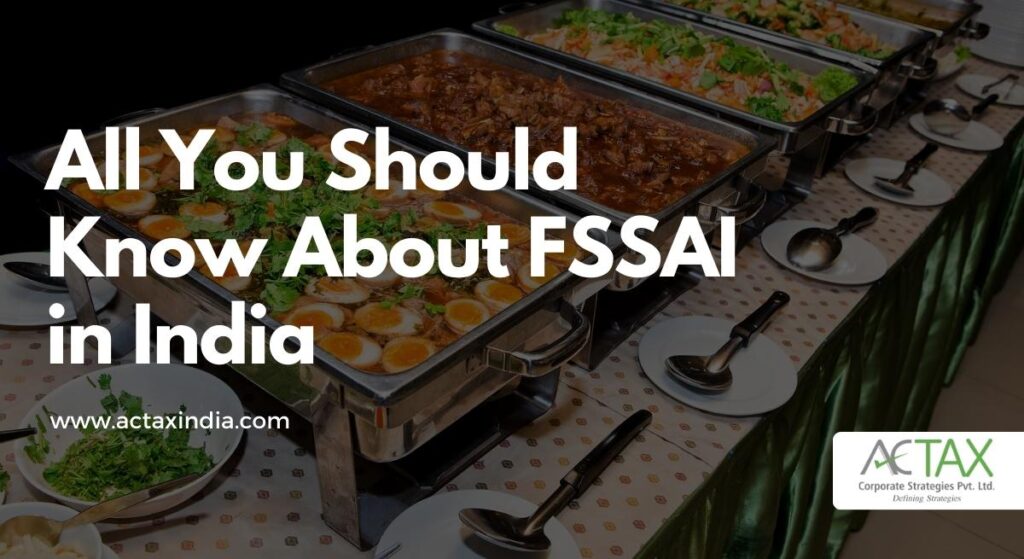Introduction to FSSAI or Food License in India
The Food Safety and Standards Authority of India (FSSAI) is a regulatory body established by the Indian government to ensure the country’s food products’ safety and standards. It operates under the Ministry of Health and Family Welfare and is crucial in safeguarding public health by regulating and supervising the food industry.
FSSAI’s primary objective is to set science-based standards for food products and ensure compliance throughout the food supply chain. It is responsible for formulating and enforcing regulations related to food safety, hygiene, labelling, packaging, and advertising. The authority ensures that the food consumed by the Indian population is safe, nutritious, and of good quality.
FSSAI operates through a network of regional and state-level offices, with its headquarters in New Delhi. It collaborates with various stakeholders, including food businesses, consumers, industry associations, and scientific institutions, to develop and implement effective food safety systems. The authority also conducts inspections, audits, and sampling of food products to monitor compliance with the established standards.
Key features of the 2006, Food Safety and Standard Act for FSSAI Registration
The Food Safety and Standards Act 2006 is a comprehensive legislation enacted by the Government of India to ensure the country’s food products’ safety and standards. Under this act, the Food Safety and Standards Authority of India (FSSAI) was established as the regulatory body responsible for implementing and enforcing food safety standards. Here are some key features of the 2006 Food Safety and Standards Act relevant to FSSAI registration:
Consolidation of Laws
The Act aims to consolidate various food-related laws in India, such as the Prevention of Food Adulteration Act, of 1954, and the Fruit Products Order, of 1955. It provides a single regulatory framework for food safety and standards in the country.
FSSAI Registration or Food License
The Act mandates that all food businesses operating in India, including manufacturers, processors, distributors, retailers, and food service establishments, must obtain FSSAI registration or Food license. The registration process ensures compliance with food safety standards and facilitates the monitoring and regulation of food businesses.
Food Safety Standards
The Act empowers FSSAI to establish and enforce food safety standards for various food products. These standards cover multiple parameters, such as permissible additives, contaminants, labeling requirements, hygiene practices, and packaging regulations. Compliance with these standards is essential for FSSAI registration.
Food Import and Export
The Act regulates the import and export of food products to ensure their safety and quality. It mandates the issuance of licenses or certificates for food imports and exports, and FSSAI plays a crucial role in monitoring and controlling the safety of imported and exported food items.
Enforcement and Inspections
The Act grants FSSAI the authority to conduct inspections, audits, and sampling of food products to ensure compliance with safety standards. FSSAI can seize or detain any food product deemed unsafe or non-compliant. It also specifies penalties and legal consequences for violations of the Act.
Food Testing and Analysis
The Act emphasizes the importance of food testing and analysis for accurate food safety assessment. It establishes food laboratories and institutes to research, test, and analyze food products. FSSAI relies on these laboratories for verifying compliance and taking appropriate action against non-compliant food businesses.
Consumer Awareness and Education
The Act recognizes the significance of consumer awareness and education in promoting food safety. It empowers FSSAI to initiate programs and campaigns to educate consumers about food safety practices, labeling requirements, and the importance of making informed choices.
Collaboration and Cooperation
The Act encourages collaboration and cooperation between FSSAI and other relevant stakeholders, such as industry associations, scientific institutions, and international organizations. FSSAI can seek these entities’ technical assistance, guidance, and expertise to develop and implement effective food safety measures.
What Is Food Safety and Compliance System (FoSCoS)?
The Food Safety and Compliance System (FoSCoS) is an online platform introduced by the Food Safety and Standards Authority of India (FSSAI) to streamline and digitize the country’s food licensing and registration process. It is a centralized system that enables food businesses to apply for licenses, make payments, submit documentation, and manage compliance with food safety regulations. FoSCoS aims to enhance transparency, efficiency, and accountability in the food safety ecosystem.
Functions & Key Features of FoSCos in India
Licensing and Registration:
FoSCoS allows food businesses to apply for and obtain licenses or registrations from FSSAI. The platform offers a user-friendly interface for submitting the necessary documents, making payments, and tracking the application’s progress. It simplifies the process by eliminating the need for physical paperwork and reducing bureaucratic hurdles.
Centralized Database:
FoSCoS maintains a centralized database of all registered food businesses in India. This database contains information such as the type of food business, address, contact details, license status, and validity. This centralized approach improves data accessibility, accuracy, and consistency across the country.
License Renewal and Modification:
Food businesses can use FoSCoS to renew their licenses before expiry and modify their existing permits as needed. The platform provides automated reminders and alerts for license renewal, ensuring businesses comply with the renewal requirements and maintain their legal status.
Compliance Monitoring:
FoSCoS facilitates real-time monitoring of food businesses’ compliance with food safety regulations. FSSAI and its authorized officials can access business information, inspection reports, and compliance history. This enables proactive enforcement, targeted inspections, and timely corrective actions in case of non-compliance.
Food Safety Training and Certification:
FoSCoS offers training modules and certification programs on food safety and hygiene practices. It enables food businesses to enhance their knowledge and skills in food safety management, promoting a responsible food handling and preparation culture.
Inspection and Audit Management:
The platform enables FSSAI officials to schedule and conduct reviews and audits of food businesses. Inspection reports, observations, and non-compliance issues can be recorded in the system, ensuring systematic documentation and follow-up actions. This helps in identifying areas of improvement and addressing non-compliance effectively.
Traceability and Recall Management:
FoSCoS facilitates the traceability of food products by capturing information related to the supply chain, including ingredients, suppliers, batch numbers, and manufacturing dates. In case of product recalls or safety alerts, the platform enables quick identification and removal of affected products from the market, ensuring consumer safety.
Complaints and Grievance Redressal:
FoSCoS provides a mechanism for consumers and stakeholders to lodge complaints and grievances related to food safety. It ensures the timely resolution of complaints by directing them to the relevant authorities and tracking the progress until resolution.
Documents required for Food License & FSSAI Registration in India
When applying for a Food Safety and Standards Authority of India (FSSAI) registration certificate, certain documents are required to ensure compliance with food safety regulations. These documents demonstrate that the food business has met the necessary criteria and is committed to maintaining high food safety standards. Here are the essential documents typically required for FSSAI registration:
- Form A or Form B: The application form for FSSAI registration is the first document that needs to be filled out.
- Identity Proof: The identity proof documents of the food business owner or proprietor, such as an Aadhaar card, voter ID card, or passport, must be provided.
- Proof of Address: Documents verifying the address of the food business premises must be submitted. This can include utility bills (electricity, water, gas), rent agreements, property ownership documents, or a municipal tax receipt.
- Partnership Deed, Certificate of Incorporation, or Memorandum of Association: If the food business is registered as a partnership firm, company, or society, relevant registration documents such as a partnership deed, certificate of incorporation, or memorandum of association should be provided to establish the legal structure of the business.
- Food Safety Management System Plan: A detailed Food Safety Management System (FSMS) plan that outlines the measures and procedures implemented to ensure food safety needs to be submitted.
- List of Food Products: A comprehensive list of products the business intends to manufacture or handle must be provided.
- NOC from Local Authorities: Depending on the location and nature of the food business, a No Objection Certificate (NOC) from the local municipal corporation or panchayat may be required.
Conclusion
The Food Safety and Standards Authority of India is dedicated to ensuring the country’s food safety and quality. Through its regulatory framework, enforcement measures, and educational initiatives, FSSAI aims to protect consumers’ health and well-being and promote a food safety culture in India.



